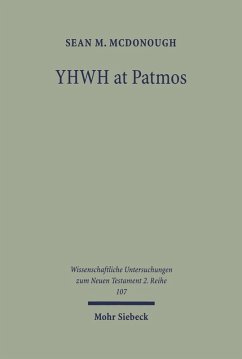In Rev. 1:4, John describes God as 'the one who is and who was and who is to come'. His description grows out of Jewish reflection on the meaning of the name YHWH, and in particular on the enigmatic words of Ex. 3:14 'I am who I am'. Sean M. McDonough traces the story of the name YHWH in the New Testament era, and its bearing on the interpretation of Rev. 1:4. Who used the name? Was it ever pronounced, and if so, how and by whom? Why did it fall into disuse? Most importantly, what did people believe the name meant? A wide range of early Jewish literature is investigated to answer these questions. Much attention is given to exegetical traditions surrounding Ex. 3:14, especially the Septuagint translation of this verse, where God is called 'the one who is'. The internal Jewish evidence, however, is only part of the story. For both John's formula and the Jewish traditions concerning the name bear a strong resemblance to Hellenistic descriptions of ultimate reality. After a survey of the relevant material, it is argued that the Jewish understanding of the name YHWH was shaped in part as a response to such ideas. Far from being a slavish copy of the Greek formulae, though, the Jewish exegetical traditions are a creative and dynamic response to a changing religious climate. John, in turn, adapts the Jewish tradition to express his own Christian understanding of God. The description of God as 'the one who is and who was and who is to come' thus affords a unique opportunity to explore the interplay of Hellenistic, Jewish, and Christian ideas in the ancient world. Born 1964; 1993 Master of Divinity; 1994 Master of Theology, Gordon Conwell Theological Seminary; 1997 Ph.D., University of St. Andrews; since 1997 Lecturer in Biblical Studies at Pacific Theological College, Suva, Fiji.
Dieser Download kann aus rechtlichen Gründen nur mit Rechnungsadresse in A, B, BG, CY, CZ, D, DK, EW, E, FIN, F, GR, HR, H, IRL, I, LT, L, LR, M, NL, PL, P, R, S, SLO, SK ausgeliefert werden.


